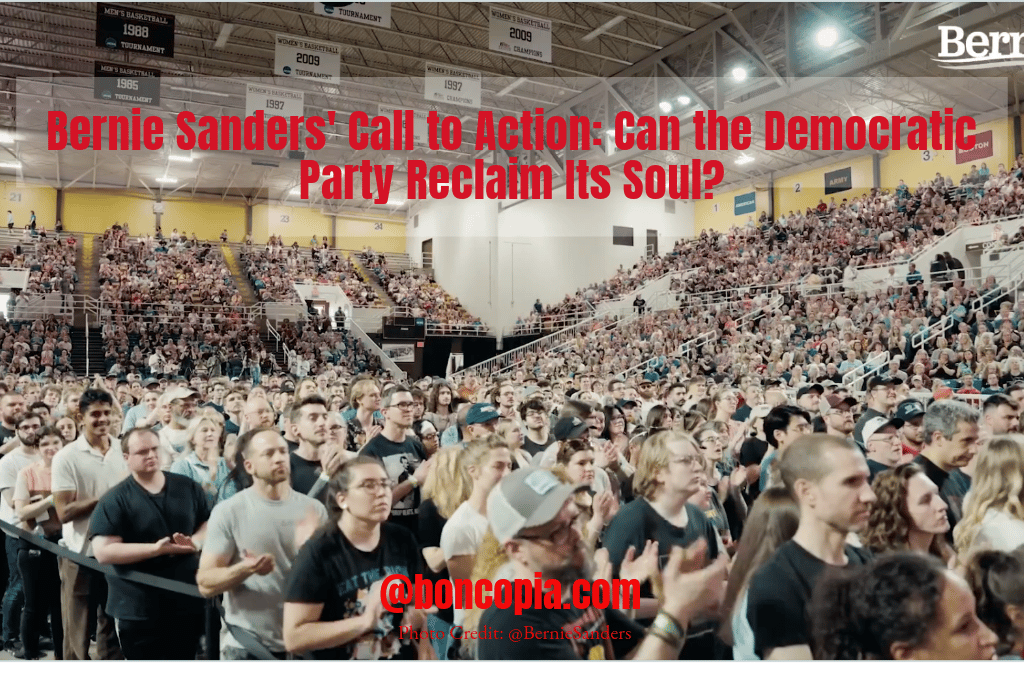Bernie Sanders' Call to Action: Can the Democratic Party Reclaim Its Soul?
5/27/20253 min read


Bernie Sanders' Call to Action: Can the Democratic Party Reclaim Its Soul?
Introduction
In a recent X post, Bernie Sanders reignited a familiar debate within the Democratic Party, questioning whether its leadership is listening to the 75% of Democrats who demand a more progressive, pro-working class direction. This post, accompanied by a video from a rally in Bethlehem, PA, underscores Sanders' enduring critique of the party's alignment with corporate interests over the needs of ordinary Americans. As we navigate the political landscape of 2025, Sanders' message resonates with a growing frustration among voters, prompting a critical examination of the Democratic Party's future. Can it reclaim its soul, or is it destined to remain a captive of the status quo?
The Rally Cry
Sanders' video, captured during a 68.90-second clip at a rally on May 3, 2025, is a powerful reminder of his consistent stance. Speaking to a packed crowd, he lambasts the Democratic Party for betraying working-class voters who have historically supported it. "We need a Democratic Party which makes a fundamental choice," he declares, "are you on the side of the working class in this country or not?" This rhetoric, familiar to those who followed his 2016 and 2020 presidential campaigns, taps into a deep well of discontent. The video's subtitles echo his concerns: rising childhood poverty, stagnating wages, and unaffordable healthcare and housing. These issues, Sanders argues, are not just economic failures but moral ones, betraying the party's foundational promise to uplift the marginalized.
The Data Behind the Discontent
Sanders' critique is not without basis. Recent economic data reveals a stark reality: the wealth gap in the United States has widened significantly. According to the Federal Reserve's 2024 report, the top 1% of Americans now hold 32.3% of the nation's wealth, up from 27% a decade ago, while the bottom 50% own just 2.5%. This disparity fuels Sanders' argument that the Democratic Party has failed to address the root causes of inequality, instead aligning with corporate donors who benefit from the status quo. A Pew Research Center survey from January 2025 further supports this, with 54% of respondents across 36 countries, including a majority in the U.S., viewing the gap between rich and poor as a "very big problem." In the U.S., ideological divisions are particularly pronounced, with 76% of liberals agreeing, compared to just 30% of conservatives.
A Party at a Crossroads
The 2024 election results, which saw Donald Trump's re-election and the subsequent dismissal of charges against him, have intensified the pressure on the Democratic Party. Political analysts, such as those at The New York Times, describe a "strategic shift" towards "patriotic populism" as a response to Trumpism. This shift aims to re-engage working-class voters, a demographic Sanders has long championed. However, the question remains: is the party leadership willing to embrace this change? Sanders' X post suggests skepticism, pointing to a disconnect between the rank-and-file Democrats and their leaders. The Progressive Democrats of America, founded in 2004 to push for a citizen-controlled party, echo this sentiment, vowing to resist what they see as a drift towards corporate elitism.
The Historical Context
Sanders' critique is not new. His political career, spanning decades, has been marked by a relentless focus on economic justice. From his early days as mayor of Burlington, Vermont, to his time in Congress, Sanders has consistently opposed war, supported veterans, and championed campaign finance reform. His refusal to join the Democratic Party caucus until 2015, despite co-founding the Congressional Progressive Caucus, underscores his independence and commitment to principle over party loyalty. The 2016 and 2020 presidential primaries, where he challenged Hillary Clinton and Joe Biden, respectively, highlighted these tensions, with Sanders arguing that the Democratic National Committee favored establishment candidates over grassroots movements.
The Path Forward
So, what does this mean for the Democratic Party in 2025? Sanders' call to action is a challenge to rethink its identity and priorities. The party must decide whether to continue its current trajectory, which some see as maintaining the status quo, or to embrace a more progressive agenda that addresses the concerns of working-class Americans. This decision is not just ideological but practical. With Trumpism on the rise and democratic institutions under strain, the Democrats face a critical moment. Can they unify around a vision that resonates with the majority of their base, or will internal divisions undermine their ability to compete?
Conclusion
Bernie Sanders' recent X post is more than a critique; it's a call to action. It reminds us that the Democratic Party's soul is at stake, and its future depends on whether it can listen to the voices of its most vulnerable supporters. As we look ahead, the question is not just whether the party can change, but whether it will. The stakes are high, and the time for action is now.
Thought Questions
How can the Democratic Party balance the demands of its progressive base with the need to appeal to a broader electorate?
What role should grassroots movements play in shaping the party's platform and policies?
Is it possible for the Democratic Party to reclaim its working-class roots without alienating its corporate donors?
How might the 2024 election results influence the party's strategy moving forward?
What lessons can the Democratic Party learn from Bernie Sanders' political career and his approach to economic inequality?
hello@boncopia.com
+13286036419
© 2025. All rights reserved.